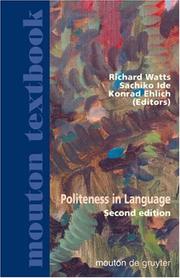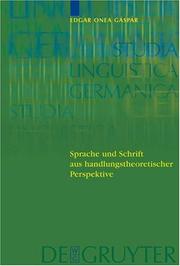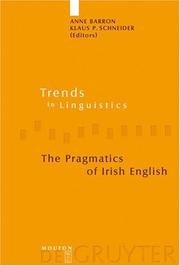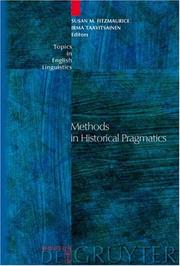| Listing 1 - 10 of 11 | << page >> |
Sort by
|
Book
ISBN: 1282425994 9786612425998 3484971053 9783484971059 9781282425996 3484312823 9783484312821 9783484312821 3111737969 Year: 2009 Publisher: Tubingen : Max Niemeyer Verlag,
Abstract | Keywords | Export | Availability | Bookmark
 Loading...
Loading...Choose an application
- Reference Manager
- EndNote
- RefWorks (Direct export to RefWorks)
Die sprachliche Ausblendung des Autorsubjekts ist prägendes Merkmal der Wissenschaftskommunikation, gleichzeitig indiziert aber jeder Wissenschaftstext durch seinen argumentativen Duktus, durch die individuelle Wahl der sprachlichen Mittel und durch explizite Teiltexte wie Vorwörter unweigerlich ein Autorsubjekt, dem der Text zugeschrieben wird. Die vorliegende Arbeit zielt darauf ab, den Autor auf diesem Hintergrund als aspektreiche Konstruktion im Text zu beschreiben. Damit verbindet sich das Ziel, den Autorbegriff, der bis jetzt vor allem in der literaturtheoretischen Diskussion eine zentrale Rolle spielte, in die Diskussion um die Domäne der Sachtexte einzubringen und für eine pragmatisch orientierte, interdisziplinär agierende Textwissenschaft anschlussfähig zu machen. Die Darstellung von Autorschaft bewegt sich auf unterschiedlichen Darstellungsniveaus. Wissenschaftstypische Handlungen wie "ein Forschungsproblem lösen" werden laufend expliziert, während wissenschaftstypische Haltungen wie Unsicherheit in hohem Maße auf Andeutung angewiesen sind. Im hier vorgeschlagenen, theoretisch orientierten Modell werden die Markierungsebenen integriert. Der "Autor-im-Text" kann damit sowohl als domänentypische wie als individuelle Figur bestimmt werden.
Authorship. --- German philology. --- Germanic philology --- Authoring (Authorship) --- Writing (Authorship) --- Literature --- Autorship. --- Pragmatics (Language). --- Text Linguistics.
Book
ISBN: 1280597704 9786613627537 3110278391 9783110278392 9783110278309 3110278308 Year: 2012 Publisher: Berlin : De Gruyter,
Abstract | Keywords | Export | Availability | Bookmark
 Loading...
Loading...Choose an application
- Reference Manager
- EndNote
- RefWorks (Direct export to RefWorks)
Die juristische Textarbeit im Kontext der Gesetzgebung ist aus rechtslinguistischer Perspektive ein bislang unbearbeitetes Forschungsfeld. Hier setzt die vorliegende Studie an: Am Beispiel der Norm(text)genese der sog. "Online-Durchsuchung" arbeitet sie empirisch die vielfältigen diskursiven Verknüpfungen und handlungsleitenden Konzepte der verschiedenen Akteure heraus. Berücksichtigt werden hierfür über 1000 Texte aus den Kommunikationsbereichen der Legislative, Exekutive, Judikative, Rechtswissenschaft und der Medien. Im Ergebnis zeigt sich die Genese rechtlicher Normen als semantischer Kampf um Kriterien für eine strukturierte Entscheidbarkeit antizipierter Sachverhaltskonflikte und damit verbundener Handlungs- bzw. Regelungsabläufe, auf den die verschiedenen Akteure sehr unterschiedlichen sprachlichen Einfluss nehmen können. Aus den empirischen Analysen werden induktiv a) Vorschläge für eine theoretische Modellierung der Normgenese und b) erste Überlegungen für eine Strukturierung der damit verbundenen juristischen Textarbeit diskutiert. Dabei werden rechtswissenschaftliche, (rechts-)linguistische, soziologische und psychologische Konzepte zu Elementen einer Theorie der Rechtsnormdiskursivität zusammengeführt.
Legal research --- Electronic information resources. --- Discourse Analysis. --- Legal Norms. --- Legal Theory. --- Pragmatics/Language.

ISBN: 3110185490 3110183005 9786612194863 1282194860 3110199815 9783110199819 9783110185492 9783110183009 9781282194861 Year: 2005 Publisher: New York : Mouton de Gruyter,
Abstract | Keywords | Export | Availability | Bookmark
 Loading...
Loading...Choose an application
- Reference Manager
- EndNote
- RefWorks (Direct export to RefWorks)
The second edition of this collection of 13 original papers contains an updated introductory section detailing the significance that the original articles published in 1992 have for the further development of research into linguistic politeness into the 21st century. The original articles focus on the phenomenon of politeness in language. They present the most important problems in developing a theory of linguistic politeness, which must deal with the crucial differences between lay notions of politeness in different cultures and the term 'politeness' as a concept within a theory of linguistic politeness. The universal validity of the term itself is called into question, as are models such as those developed by Brown and Levinson, Lakoff, and Leech. New approaches are suggested. In addition to this theoretical discussion, an empirical section presents a number of case studies and research projects in linguistic politeness. These show what has been achieved within current models and what still remains to be done, in particular with reference to cross-cultural studies in politeness and differences between a Western and a non-Western approach to the subject. The publication of this second edition demonstrates that the significance of the collection is just as salient in the first decade of the new millennium as it was at the beginning of the 1990's.
800:316 --- 800:316 Sociolinguistiek --- Sociolinguistiek --- Sociolinguistics --- Pragmatics --- Grammar --- Social psychology --- Politeness (Linguistics). --- Politeness (Linguistics) --- Languages & Literatures --- Philology & Linguistics --- Courtesy (Linguistics) --- Courtesy --- Linguistics --- Politeness. --- pragmatics (language). --- Courtesy.

ISBN: 1282195573 9786612195570 3110201860 9783110201864 3110189585 9783110189582 9781282195578 6612195576 Year: 2006 Publisher: Berlin ; New York : W. de Gruyter,
Abstract | Keywords | Export | Availability | Bookmark
 Loading...
Loading...Choose an application
- Reference Manager
- EndNote
- RefWorks (Direct export to RefWorks)
This study develops solutions to the problem of the linguistic handling of writing from a new perspective arising from the action-oriented nature of writing. The main theory is that writing does not compete with language, but is rather a component of it. The results of the study form a new theory on the relationship between language and writing.
Speech acts (Linguistics) --- Language and languages --- Writing --- Chirography --- Handwriting --- Ciphers --- Penmanship --- Illocutionary acts (Linguistics) --- Speech act theory (Linguistics) --- Speech events (Linguistics) --- Linguistics --- Speech --- Philosophy. --- Philosophy --- Pragmatics (language). --- language. --- social actions. --- writing.
Book
ISBN: 3110368366 3110353288 311035313X Year: 2014 Publisher: De Gruyter, Inc.
Abstract | Keywords | Export | Availability | Bookmark
 Loading...
Loading...Choose an application
- Reference Manager
- EndNote
- RefWorks (Direct export to RefWorks)
Die einzelnen Kapitel des Buches bieten einen Einblick in die Methoden der Fachprosa- und Fachsprachenforschung - der zwei grundsätzlichen Ansätze bei der wissenschaftlichen Betrachtung historischer Fachtexte. Die Quellentexte werden hier nicht nur aus mediävistisch-philologischer und wissenschaftshistorischer Perspektive beleuchtet, sondern auch aus Sicht der historischen Pragmatik als einer relativ jungen Forschungsrichtung. Im Buch werden Analysen von mittelalterlich-frühneuzeitlichen Texten verschiedener Fächer präsentiert, die sowohl die traditionellen Zugänge dokumentieren als auch neue Möglichkeiten skizzieren, die sich dank der technischen Errungenschaften bei der Untersuchung von historischen Fachtexten in der Gegenwart anbieten.Die Beiträge beweisen, dass die intensive Beschäftigung mit Textzeugen heute als integrativer Ansatz zur Vereinigung von Fachprosa- und Fachsprachenforschung angesehen werden kann und dass es deshalb nahezu unmöglich ist, beide Ansätze immer genau voneinander zu trennen.
German language --- Ashkenazic German language --- Hochdeutsch --- Judaeo-German language (German) --- Judendeutsch language --- Judeo-German language (German) --- Jüdisch-Deutsch language --- Jüdischdeutsch language --- Germanic languages --- Word formation --- Technical German --- Pragmatics (language). --- Terminology.
Book
ISBN: 9783110231489 3110231484 1283399121 9786613399120 3110231476 Year: 2010 Publisher: De Gruyter
Abstract | Keywords | Export | Availability | Bookmark
 Loading...
Loading...Choose an application
- Reference Manager
- EndNote
- RefWorks (Direct export to RefWorks)
Die vorliegende 5. Auflage der ,Einführung in die Sprechakttheorie' wurde überarbeitet und aktualisiert und um ein Kapitel zur Beschreibung von Sprechaktsequenzen ergänzt. Das Buch behandelt die Lehre der Teilakte des Sprechakts nach Austin und Searle, die Rolle der Sprechaktverben im performativen und referierenden Gebrauch, die Klassifikation der Sprechakte nach Searle, die Untermuster der direktiven Sprechakte, eine Theorie zur Erfassung der typischen Äußerungsformen für einzelne Sprechakte, die Methode der Bedingungsbeschreibung für ,Versprechen' nach Searle und eine Darstellung und Kritik der Theorie der indirekten Sprachakte. Darüber hinaus enthält das Arbeitsheft ein ausführliches Kapitel über Sprechaktsequenzen. Anhand der initialen Sprechakte ,Frage' und ,Vorschlag' wird exemplarisch in das System der Reaktionsformen im zweiten Zug eingeführt. Abschließend wird eine allgemeine Sprechaktsequenztheorie vorgestellt. Das Buch ist für den akademischen Unterricht und zum Selbststudium geeignet. Es enthält zu jedem Kapitel Aufgaben mit Lösungen.
Speech acts (linguistics). --- Language arts & disciplines --- Linguistics --- Pragmatics. --- Speech acts (Linguistics) --- Illocutionary acts (Linguistics) --- Speech act theory (Linguistics) --- Speech events (Linguistics) --- Language and languages --- Speech --- Philosophy --- Linguistics. --- Pragmatics /Language. --- Speech Act.

ISBN: 3110184699 3110898934 9783110898934 9783110184693 Year: 2005 Volume: 164 Publisher: Berlin ; New York : Mouton de Gruyter,
Abstract | Keywords | Export | Availability | Bookmark
 Loading...
Loading...Choose an application
- Reference Manager
- EndNote
- RefWorks (Direct export to RefWorks)
Irish English, while having been the focus of investigations on a variety of linguistic levels, reveals a dearth of research on the pragmatic level. In the present volume, this imbalance is addressed by providing much-needed empirical data on language use in Ireland in the private, official and public spheres and also by examining the use of Irish English as a reflection of socio-cultural norms of interaction. The contributions cover a wide range of pragmatic phenomena and draw on a number of frameworks of analysis. Despite the wide scope of topics and methodologies, a relatively coherent picture of conventions of language use in Ireland emerges. Indirectness and heterogeneity on the formal level are, for instance, shown to be features of Irish English. This volume is the first book-length treatment of the pragmatics of a national variety of English, or any other language. Indeed, it could be considered a first step towards a new discipline, variational pragmatics, at the interface of pragmatics and dialectology. This book is of primary interest to researchers and students in pragmatics, variational linguistics, Irish English, English as Foreign Language (EFL), cross-cultural communication and discourse analysis. Furthermore, the pragmatic descriptions provided will be of practical use in the increasingly important English as Second Language (ESL) context in Ireland. Finally, it is also of relevance to professionals dealing with Ireland and, indeed, to anyone interested in a deeper understanding of Irish culture.
Sociolinguistics --- Pragmatics --- English language --- Dialectology --- Ireland --- Pragmatics. --- Anglais (Langue) --- Pragmatique --- Discourse analysis. --- Social aspects --- Variation --- Analyse du discours --- Aspect social --- Pragmalinguistics --- General semantics --- Language and languages --- Logic, Symbolic and mathematical --- Semantics (Philosophy) --- Germanic languages --- Philosophy --- English /language. --- Sociolinguistics. --- dialectology. --- discourse analysis. --- pragmatics (language).
Book
ISBN: 1282196251 9786612196256 3110204347 9783110204346 9783110175424 3110175428 Year: 2007 Publisher: Berlin ; New York : De Gruyter,
Abstract | Keywords | Export | Availability | Bookmark
 Loading...
Loading...Choose an application
- Reference Manager
- EndNote
- RefWorks (Direct export to RefWorks)
Der Sammelband widmet sich dem Thema "sprachliche Kürze" in umfassender Weise. Thematisiert werden u.a. Aspekte der Sprachökonomie, der Kommunikationstheorie, Kurzwörter in verschiedenen europäischen Sprachen, Kürze in Wortbildung und Syntax, Rhetorik und Stilistik, Kürze als Prinzip der Vornamengebung. Er enthält Beiträge namhafter Autorinnen und Autoren, in denen sowohl Forschungsüberblicke gegeben als auch neuartige Ansätze vorgestellt werden. Der bislang einzigartige Band leuchtet die unterschiedlichen Dimensionen des komplexen Gegenstandes in nahezu enzyklopädischem Zugriff aus.
Pragmatics. --- Economy (Linguistics) --- Pragmalinguistics --- General semantics --- Language and languages --- Logic, Symbolic and mathematical --- Semantics (Philosophy) --- Efficiency (Linguistics) --- Linguistic economy --- Linguistic analysis (Linguistics) --- Linguistics --- Philosophy --- Pragmatics --- 803.0-3 --- 803.0-3 Duits: lexicografie --- Duits: lexicografie --- Economy (Linguistics). --- Effizienz. --- Kommunikation. --- Kurzwort. --- Prägnanz. --- Sprache. --- Abbreviation. --- language typology. --- linguistic expressions. --- pragmatics (language).
Book
ISBN: 1283857154 311028586X 9783110285864 9781283857154 9783110285802 3110285800 Year: 2012 Publisher: Berlin ; Boston : De Gruyter,
Abstract | Keywords | Export | Availability | Bookmark
 Loading...
Loading...Choose an application
- Reference Manager
- EndNote
- RefWorks (Direct export to RefWorks)
This book investigates specific syntactic means of event elaborationacross seven Indo-European languages (English, German, Norwegian,French, Russian, Latin and Ancient Greek): bare and comitative smallclauses ("absolutes"), participle constructions and related clause-like butnon-finite adjuncts that increase descriptive granularity with respect toconstitutive parts of the matrix event (elaboration in the narrowestsense), or describe eventualities that are co-located and connectedwith but not part of the matrix event. The book falls in twoparts. Part I addresses central theoretical issues: How is the co-eventiveinterpretation of such adjuncts achieved? What is the internal syntax ofparticipial and converb constructions? How do these constructionsfunction at the discourse level, as compared to various finite structuresthat are available for co-eventive elaboration? Part II takes an empiricalcross-linguistic perspective. It consists of five self-contained chapters thatare based on parallel corpora and study either the use of a specificconstruction across at least two of the seven object languages, or how aspecific construction is rendered in other languages.
Grammar, Comparative and general --- Semantics. --- Formal semantics --- Semasiology --- Semiology (Semantics) --- Comparative linguistics --- Information theory --- Language and languages --- Lexicology --- Meaning (Psychology) --- Voice (Grammar) --- Syntax --- Adjunctivals (Grammar) --- Adjuncts (Grammar) --- Adjuncts. --- Syntax. --- Voice. --- Adjunctivals --- Linguistics --- Philology --- Grammar, Comparative and general Syntax --- Corpus (Linguistics). --- Discourse Analysis. --- Pragmatics (Language).

ISBN: 9783110190410 3110190419 9786612194184 1282194186 3110197820 9783110197822 9781282194182 6612194189 Year: 2007 Volume: 52 Publisher: Berlin ; New York : Mouton de Gruyter,
Abstract | Keywords | Export | Availability | Bookmark
 Loading...
Loading...Choose an application
- Reference Manager
- EndNote
- RefWorks (Direct export to RefWorks)
This volume represents a timely collective review and assessment of what it is we do when we do English historical pragmatics or historical discourse analysis. The context for the volume is a critical assessment of the assumptions and practices defining the body of research conducted on the history of the English language from the perspective of historical pragmatics, broadly construed. The aim of the volume is to engage with matters of approach and method from different perspectives; accordingly, the contributions offer insights into earlier communicative practices, registers, and linguistic functions as gleaned from historical discourse. The essays are grouped according to their orientations within the scope of the study of language and meaning in historical texts, both literary and non-literary. The structure of the volume thus represents a critical convergence of traditions of reading texts and analyzing discourse and this in turn exposes key questions about the methods and the outcomes of such readings or analyses. The volume contributes to the growing maturity of historical pragmatic research approaches as it exemplifies and extends the range of approaches and methods that dominate the research enterprise. Contributors are prominent international scholars in the fields of linguistics, literature, and philology: Dawn Archer, Birte Bös, Laurel Brinton, Gabriella Del Lungo Camiciotti, James Fitzmaurice, Susan Fitzmaurice, Monika Fludernik, Andreas Jucker, Thomas Kohnen, Ursula Lenker, Lynne Magnusson, and Irma Taavitsainen.
Pragmatics. --- English language --- Discourse analysis. --- Speech acts (Linguistics) --- Historical linguistics. --- History. --- Historical linguistics --- Pragmatics --- Diachronic linguistics --- Dynamic linguistics --- Evolutionary linguistics --- Language and languages --- Illocutionary acts (Linguistics) --- Speech act theory (Linguistics) --- Speech events (Linguistics) --- Discourse grammar --- Text grammar --- Pragmalinguistics --- History --- Language and history --- Linguistics --- Speech --- Semantics --- Semiotics --- General semantics --- Logic, Symbolic and mathematical --- Semantics (Philosophy) --- Philosophy --- Discourse analysis --- Germanic languages --- English language - History. --- Language change. --- corpora. --- discourse analysis. --- methodology. --- pragmatics (language).
| Listing 1 - 10 of 11 | << page >> |
Sort by
|

 Search
Search Feedback
Feedback About UniCat
About UniCat  Help
Help News
News